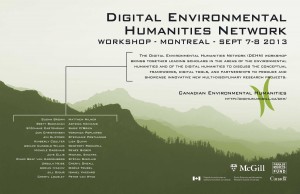On July 11th and 12th I was at a conference in Saskatoon on Social Digital Scholarly Editing. This conference was organized by Peter Robinson and colleagues at the University of Saskatchewan. I kept conference notes here.
I gave a paper on “Social Texts and Social Tools.” My paper argued for text analysis tools as a “reader” of editions. I took the extreme case of big data text mining and what scraping/mining tools want in a text and don’t want in a text. I took this extreme view to challenge the scholarly editing view that the more interpretation you put into an edition the better. Big data wants to automate the process of gathering and mining texts – big data wants “clean” texts that don’t have markup, annotations, metadata and other interventions that can’t be easily removed. The variety of markup in digital humanities projects makes it very hard to clean them.
The response was appreciative of the provocation, but (thankfully) not convinced that big data was the audience of scholarly editors.

